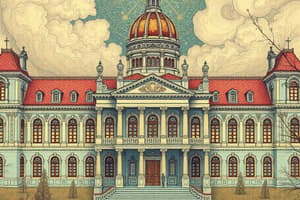Podcast
Questions and Answers
Which branch of political science focuses on the interaction between countries?
Which branch of political science focuses on the interaction between countries?
What is defined as the ability to influence others or achieve a desired outcome?
What is defined as the ability to influence others or achieve a desired outcome?
Which type of authority is based on acceptance through charisma or tradition?
Which type of authority is based on acceptance through charisma or tradition?
What distinguishes governance from government?
What distinguishes governance from government?
Signup and view all the answers
Which branch of political science examines the legal framework of government?
Which branch of political science examines the legal framework of government?
Signup and view all the answers
What is essential for a political organization to be considered a state?
What is essential for a political organization to be considered a state?
Signup and view all the answers
Which of the following best describes the focus of comparative politics?
Which of the following best describes the focus of comparative politics?
Signup and view all the answers
Which concept refers to the acceptance of an authority's right to rule?
Which concept refers to the acceptance of an authority's right to rule?
Signup and view all the answers
Which political ideology places a strong emphasis on individual rights and market-based economies?
Which political ideology places a strong emphasis on individual rights and market-based economies?
Signup and view all the answers
What is a characteristic of totalitarian regimes?
What is a characteristic of totalitarian regimes?
Signup and view all the answers
Which political system is characterized by the concentration of power in a single party without checks on authority?
Which political system is characterized by the concentration of power in a single party without checks on authority?
Signup and view all the answers
What is one of the primary goals of socialism?
What is one of the primary goals of socialism?
Signup and view all the answers
Which of the following best describes the effects of globalization?
Which of the following best describes the effects of globalization?
Signup and view all the answers
What is a significant modern political challenge related to the environment?
What is a significant modern political challenge related to the environment?
Signup and view all the answers
Which political process involves choosing political leaders and representatives?
Which political process involves choosing political leaders and representatives?
Signup and view all the answers
What role do interest groups primarily serve in the political system?
What role do interest groups primarily serve in the political system?
Signup and view all the answers
Which political ideology is characterized by the promotion of a classless society?
Which political ideology is characterized by the promotion of a classless society?
Signup and view all the answers
What is a common measure of public opinion?
What is a common measure of public opinion?
Signup and view all the answers
Study Notes
Introduction to Political Science 12
- Political science is the systematic study of government, politics, and power.
- It analyzes the structures, processes, and behaviors of political systems at various levels.
- Key concepts include power, authority, legitimacy, and the state.
Branches of Political Science
- Constitutional Law: Examines the legal framework of government, including constitutional interpretation, governmental branch powers, and individual rights.
- Comparative Politics: Studies political systems across different countries and cultures, analyzing institutions, policies, and behaviors within various contexts.
- International Relations: Focuses on interactions between countries, encompassing diplomacy, war, trade, and international organizations.
- Public Administration: Examines the implementation of government policies, covering bureaucracy, public service, and operational efficiency.
- Political Theory: Analyzes fundamental political concepts, ideas, and values, exploring philosophical questions about justice, liberty, democracy, and political obligation.
Key Concepts in Political Science
- Power: The ability to influence others or achieve a desired outcome, including coercive, persuasive, and institutional power.
- Authority: The right to command or make decisions, based on acceptance (e.g., tradition, charisma, legal procedures).
- Legitimacy: Acceptance of authority's right to rule (e.g., traditional, charismatic, rational-legal).
- The State: A political organization with a monopoly on legitimate force within a defined territory, characterized by a defined territory, permanent population, a government, and sovereignty.
- Governance: The processes by which governments make and implement decisions, accounting for the influence of non-state actors.
- Politics: Complex interactions in exercising power and making decisions about resource allocation in society, including negotiation, compromise, and conflict resolution.
Political Ideologies
- Liberalism: Emphasizes individual rights, freedoms, and limited government, prioritizing individual liberty, tolerance, and market-based economies.
- Conservatism: Values tradition, order, and social stability, prioritizing established institutions and social/economic responsibility.
- Socialism: Advocates for collective resource ownership and social equality, aiming for social justice and reducing income inequality. It ranges from democratic socialism to authoritarian interpretations.
- Fascism: Emphasizes national unity and state supremacy, characterized by extreme nationalism, authoritarianism, and rejection of individual rights when conflicting with national interests.
- Communism: Advocates for a classless society and collective ownership of all means of production, involving centrally planned economies and single-party systems, often resulting in authoritarianism.
Political Systems
- Democracies: Citizens exercise power through elected representatives, characterized by free and fair elections, majority rule, and civil liberties protection.
- Authoritarian Regimes: Power concentrated in a few or a single party, lacking checks on power.
- Totalitarian Regimes: Highly restrictive and controlling regimes heavily regulating all aspects of life, usually with a single-party rule.
- Monarchy: A political system based on hereditary succession to the head of state, varying from absolute to constitutional monarchies.
Political Processes
- Elections: Procedures for selecting leaders, including voter registration, campaign finance, and election security, considering voter turnout, campaign strategies, and voting behavior.
- Political Parties: Organize to contest elections and influence government. They shape public policy, organize support, and campaign for their ideals.
- Interest Groups: Seek to influence government policy, representing diverse interests (business, labor, environmental, social) through lobbying, advocacy, and public awareness campaigns.
- Public Opinion: Aggregate views of citizens on issues, crucial in understanding political trends and policy responsiveness.
Modern Political Challenges
- Globalization: Increasing global interconnectedness, raising issues of national sovereignty, cultural exchange, and economic inequality.
- Terrorism: Political violence seeking to create fear and achieve objectives, necessitating security measures while respecting human rights.
- Climate Change: Global warming's environmental impact, requiring international cooperation, policy choices for carbon reduction, emissions trading, and sustainable development.
- Ethnic and Religious Conflicts: Disputes based on ethnic or religious differences, leading to political instability, violence, and humanitarian crises.
- Economic Inequality: The gap between rich and poor, posing major political challenges for social welfare and economic development.
Conclusion
- Political Science offers tools to understand complex political phenomena, illuminating power dynamics and governance.
- It emphasizes key concepts and processes, enabling comprehension of current political issues globally.
Studying That Suits You
Use AI to generate personalized quizzes and flashcards to suit your learning preferences.
Description
Explore the fundamental concepts and branches of political science in this engaging quiz. Delve into key topics such as constitutional law, comparative politics, international relations, and public administration, along with their significance in understanding government structures and processes. Test your knowledge and enhance your comprehension of political systems.




